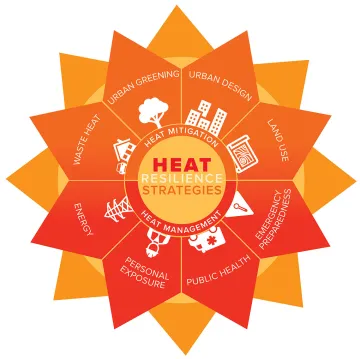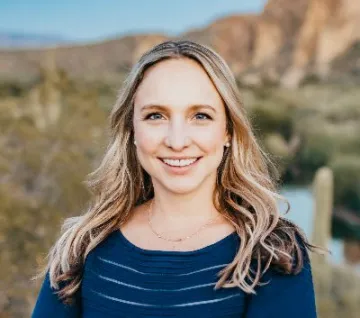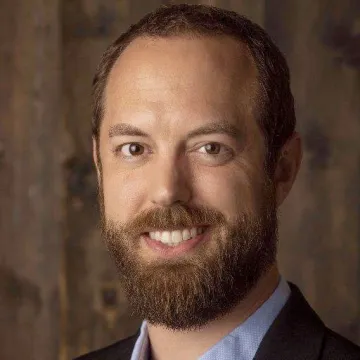Extreme heat is the deadliest climate hazard in the U.S. How are urban planners tackling it?

Photo by Chinnapong, courtesy Adobe Stock Photos.

Heat resilience strategies. Image courtesy Ladd Keith.
“Extreme heat is the deadliest climate hazard in the United States,” write researchers Sara Meerow, assistant professor of geographical sciences and urban planning at Arizona State University and Ladd Keith, assistant professor of planning and sustainable built environments at the University of Arizona. “Climate change and the urban heat island effect are increasing the number of dangerously hot days in cities worldwide and the need for communities to plan for extreme heat.”
In a paper published in December 2021 in the Journal of the American Planning Association, Meerow and Keith analyzed the results of their extreme heat survey of planners from diverse cities across the United States. The survey was conducted “to establish baseline information for a growing area of planning practice and scholarship that future research can build on,” they write.
Their conclusion? Planners are particularly concerned with the environmental and public health impacts of climate change and extreme heat—but there remain many challenges to adequately planning for the risk.

Sara Meerow, Assistant Professor of Geographical Sciences and Urban Planning, Arizona State University
“Especially in affected communities, planners claim they address heat in plans and implement heat mitigation and management strategies such as urban forestry, emergency response and weatherization, but perceive many barriers related to human and financial resources and political will.” write Meerow and Keith.
In a February 4, 2022 interview with KJZZ Radio of Phoenix, Keith summarizes and discusses the results of the survey. The researchers found that planners in the Northeast U.S. were more dedicated to implementing strategies of reducing extreme heat risk, while large cities are at the forefront of strategizing change to minimize harm.
“Eighty percent of planners have already said that their communities were impacted by extreme heat,” says Keith. However, medium- to small-sized communities face a larger barrier with lack of resources to heat knowledge.
Though reports of extreme heat are growing, Keith notes that the risk is less addressed than other climate risks such as flooding or wildfires. Within the context of extreme heat, however, the survey by Meerow and Keith found that planners’ top concerns include water and energy use, vegetation, wildlife and public health.

Ladd Keith, Assistant Professor of Planning and Sustainable Built Environments
Keith was surprised to learn that planners were more concerned with climate change as the cause of extreme heat than the urban heat island effect. He stresses the importance of addressing both contributors to heat risk and notes that it is an opportunity to educate planners. “The choices they make and the choices communities make influence the urban heat island effect,” he says. Indeed, in many communities the urban heat island effect currently has a larger contribution to extreme heat than climate change.
Keith, who joined CAPLA in 2009, is an interdisciplinary researcher working at the intersection of urban planning and climate change to create more sustainable and resilient cities. He has over a decade of experience working with diverse stakeholders to solve complex urban challenges in cities across the U.S. His current research explores urban heat governance and how cities can increase heat resilience through the mitigation and management of heat. In addition to founding and leading CAPLA’s Bachelor of Science in Sustainable Built Environments, Keith teaches public participation and dispute resolution as well as climate action planning.



